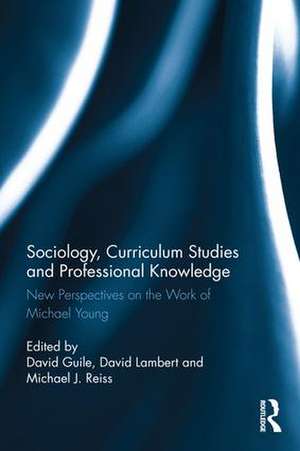Sociology, Curriculum Studies and Professional Knowledge: New Perspectives on the Work of Michael Young
Editat de David Guile, David Lambert, Michael J. Reissen Limba Engleză Hardback – 10 aug 2017
Following Michael’s long and distinguished career – dating back to before Knowledge and Control: New Directions for the Sociology of Education, which Michael edited in 1971 – recent years have seen an upsurge in both academic and policy interest in his work, including the new concern he expressed for knowledge in his 2007 book Bringing Knowledge Back In.
The book concludes with an appreciation and a response to the authors from Michael Young and a Coda from Charmian Cannon, who was on the Institute of Education panel that appointed Michael to his post in 1967. This timely book is a unique critique and celebration, written by experts whose own careers have been affected by Michael, and will appeal to all those with an interest in the work of Michael Young.
Preț: 764.20 lei
Preț vechi: 1102.76 lei
-31% Nou
Puncte Express: 1146
Preț estimativ în valută:
146.23€ • 153.06$ • 121.71£
146.23€ • 153.06$ • 121.71£
Carte tipărită la comandă
Livrare economică 31 martie-14 aprilie
Preluare comenzi: 021 569.72.76
Specificații
ISBN-13: 9781138675834
ISBN-10: 1138675830
Pagini: 306
Ilustrații: 8
Dimensiuni: 156 x 234 x 20 mm
Greutate: 0.45 kg
Ediția:1
Editura: Taylor & Francis
Colecția Routledge
Locul publicării:Oxford, United Kingdom
ISBN-10: 1138675830
Pagini: 306
Ilustrații: 8
Dimensiuni: 156 x 234 x 20 mm
Greutate: 0.45 kg
Ediția:1
Editura: Taylor & Francis
Colecția Routledge
Locul publicării:Oxford, United Kingdom
Public țintă
Postgraduate, Professional, and UndergraduateCuprins
1. Consistency, contradiction and ceaseless enquiry in the work of Michael Young Section 1: Sociology of Education 2. Taking subject knowledge out and putting it back in again? A journey in the company of Michael Young 3. The New Organon of Michael Young 4. ‘Beyond the present and the particular’: Similarities and differences between Michael Young’s and Charles Bailey’s arguments for the public provision of liberating forms of education for all 5. Powerful sociological knowledge? An analysis of the British Sociological Association and the sociology school curriculum in England 6. A Durkeimian approach to knowledge and democracy 7. What is educationally worthwhile knowledge? Revisiting the case for powerful knowledge 8. Michael Young’s influence on the sociology of education Section 2: Curriculum Studies 9. Michael Young and the crises of capitalism 10. The curriculum arguments of Michael Young and John White 11. The road to Future 3: The case of geography 12. Powerful knowledge and the formal curriculum 13. Powerful knowledge – moving us all forwards or backwards? 14. ‘Making’ and ‘taking’ problems: The curriculum field and Michael Young Section 3: Professional/Vocational Knowledge and Education 15. Professional knowledge in the 21st century: ‘Immaterial’ labour and its challenge for the ‘trinary’ 16. From the ‘general’ to the ‘organic’ intellect: Reflections on the concepts of specialization and the curriculum of the future 17. Learning from qualification reform: The value and limitations of the notion of powerful knowledge 18. Theorising the conditions for theoretical knowledge in vocational education 19. Conceptualising vocational knowledge: The high road and the middle road Section 4 20. An appreciation and a response 21. Coda
Notă biografică
David Guile is Professor of education and work at the UCL Institute of Education, University of London, UK.
David Lambert is Professor of geography education at the UCL Institute of Education, University of London, UK.
Michael Reiss is Professor of science education at the UCL Institute of Education, University of London, UK.
David Lambert is Professor of geography education at the UCL Institute of Education, University of London, UK.
Michael Reiss is Professor of science education at the UCL Institute of Education, University of London, UK.
Descriere
This volume brings together an international set of contributors in education research, policy and practice to respond to the influence the noted academic Professor Michael Young has had on sociology, curriculum studies and professional knowledge over the past fifty years.
